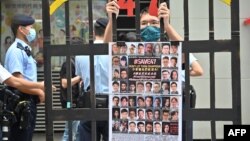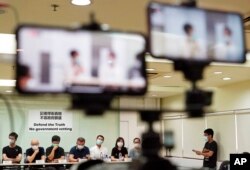From compulsory classes on national security to uncertainty over what can be discussed about Hong Kong's new laws, journalism students and media professors are navigating a difficult landscape.
Some journalism students have said that a National Security Law passed in 2020 is like "the elephant in the room" when it comes to class debates and discussions.
The Chinese government said it introduced the law to bring stability after anti-government protests in 2019. It criminalizes secession, terrorism, and collusion with foreign forces and carries hefty sentences.
Already more than 100 protesters, journalists and lawmakers have been detained under the act.
Hong Kong's national security bureau told VOA last year the city's government is firmly committed to safeguarding press freedom.
But reporters say ambiguity about the law's reach makes it hard to find people willing to go on record. And some students and media professors are seeing a similar effect — even inside the classroom.
The risk of running afoul of the law led the students and one of the professors who spoke with VOA for this article to ask for anonymity.
One of those students, who is at the University of Hong Kong, said the law created a void in some journalism classes.
"In classes when teachers go up, it seems a normal classroom, it seems nothing has changed but the elephant in the room is never addressed," the student said. "It's lingering, like a tension, and we want to ask, 'Can we do this? Can we do that?' But nobody is going to ask it, nobody is going to answer it. So, it never comes up."
Several Hong Kong universities offer media studies but figures show that the number of journalism students has dropped in recent years.
Data from a joint admissions system showed a drop in media students at four public universities, according to analysis by the South China Morning Post.
Its October 2021 report found that Hong Kong University's journalism school had 865 applicants in 2021, down from 1,726 in 2016. The CUHK school had 1,541 applicants in 2021, down from 2,071 in 2016.
And as of 2022, students must pass a mandatory national security course on Basic and National Security Laws.
A spokesperson for the Education Bureau told VOA that the regional government "attaches great importance to upholding academic freedom and institutional autonomy."
The spokesperson said via email, "These specific and clear safeguards have not been altered in any way and remain in full force. As such, it is a matter for the institutions and academics to choose their topic of study."
The spokesperson added that "safeguarding national sovereignty, security and development interests, is an indisputable duty" and that the Hong Kong region is "no exception."
The email added, "With proper respect to institutional autonomy," the Education Bureau “maintains close communication with the institutions on issues relevant to the promotion of national security education.”
One of the students who spoke with VOA said the change in the media environment, while not surprising, was still disappointing.
The individual, who is in their early 20s and from mainland China, said even student journalists find it hard to get sources to go on record for school assignments.
"We were supposed to interview people about certain government development projects, it's nothing sensitive, but people were very hesitant to give their full name," the student said.
Professors in media say they had to change some of their programs or teaching methods to include the law.
Jeffrey Timmermans, who oversaw the undergraduate program at the Hong Kong University until 2021, said that while the university did not change how it approached its courses, "we had to radically redesign our media law program."
"It was so new at the time, the content came as quite a surprise, it was much more aggressive than any of us in the department thought," said Timmermans, who currently teaches at the Walter Cronkite School of Journalism and Mass Communication at Arizona State University.
Despite that, Timmermans said, they decided as a faculty to keep doing what they previously done.
Another lecturer, who teaches media law, said teachers are careful in how they approach the subject: "We do present the position of other jurisdictions in terms of the national security law, [but] with a warning, that we're not presenting to say other places [have a] fundamental logical flaw of comparison, [but] to show students what people accept as a national security issue is different depending on where you are."
But, the professor said, they try to approach the security law like any subject.
"We have to be clear to them we're not telling them to be advocates or go break the law … they need to understand what the powerful difference is. I have to allow them to draw their own conclusions," the lecturer added.
Still, the Hong Kong-based lecturer said, the topic is almost a non-discussion: "The deafening silence comes from the student side. In that class, we do not have questions. Blank faces."
Even when the lecturer created an online document so students could anonymously ask questions, no one touched it.
Keith Richburg, director of journalism and media studies at the University of Hong Kong, said that his school's courses haven't changed.
"We're teaching the nuts and bolts of how to be a journalist and none of that is pushing up to these areas of terrorism, secession or colluding with foreign forces, we're just nowhere near that," Richburg told VOA.
The journalist, who is also president of the Hong Kong Foreign Correspondents Club, said he hadn't seen a drop off in applicants to the school. "In fact we've seen the opposite, we've seen how a lot more students recognise how important journalism is." Richburg told VOA.
One concern however, he said, is whether student journalists will be careful enough in their reporting.
"If students are going to do stories about activists who have fled or anything like that, I would just tell them be absolutely careful, you're doing factual reporting. You're not appearing to promote or advocate any kind of positions that get you in a trouble, you're not taking a side, you're just reporting," he said.
Concerns over how to walk that line were raised by one of the students who spoke with VOA.
Asked about covering Hong Kong, the student said, "I'd rather not at all. I will only do it on a very broad base. ... I've done barely any reporting politically about Hong Kong coverage but that thought still enters your mind, 'Can [the authorities] come and bite me tomorrow or five years later?'"





